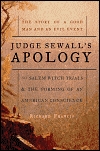When Do Apologies for Past Crimes Make Sense?

Naked self-interest lurked in the depths of each of those pairs of trousers. Back at home some fast food joints had removed the ‘French’ from French fries and substituted ‘freedom’ instead. In that atmosphere, how to persuade indignant Gallic shoppers that they didn’t have to swallow their pride in order to buy a pair of American jeans?
It wasn’t me, the label was saying, I didn’t re-elect the president or invade Iraq or politicize my potatoes. The original root of the word apology means defence, on the face of it the exact opposite of what we might expect. The ambiguity provides a useful toggle between admission and exoneration, and throughout the ages politicians and other public figures have been quick to flip the switch.
In 1172, Henry II of England did penance for the murder of Thomas à Becket, but he’d already made sure the crime couldn’t be pinned on him. His story was that he’d asked a rhetorical question, ‘Who will rid me of this troublesome priest?’ Four knights, eager to ingratiate themselves with their sovereign, had acted out an unexpectedly literal reply. By allowing himself to be flogged by monks as he walked to Canterbury Cathedral in sackcloth and ashes, King Henry was simply underlining the fact that he himself was out of the frame.
One way in which leaders have gained the high moral ground is by apologising for actions that were patently nothing to do with them in the first place. In 1997 President Clinton took it upon himself to apologise for the Tuskegee Syphilis Study. For decades medical researchers in Tennessee had deceived black male patients by giving them placebos instead of treatment, so that the unhindered progress of their illness could be monitored. By his apology, a quarter of a century after this disgraceful betrayal of medical ethics came to light, Clinton neatly identified himself with the victims rather than the authorities who had perpetrated it - and whom he was claiming to speak for. He proved a lot less keen, the following year, to admit culpability in the Monica Lewinsky affair - proving it’s easier to stitch apologies into pairs of jeans than to attach one to a certain blue dress.
For all of us it’s difficult to say sorry for something we’ve actually done. An apology feels like a little suicide. And those in public life fear making one will suggest weakness and unreliability, a poor capacity for decision-making, ultimately a fatal crack in the façade of leadership.
But apology can be a creative act. It can liberate both an individual and his or her society. Apology frees you from the past and gives access to the future. It allows a person to evolve in response to the shifting demands of life. Apology can be heroic.
Samuel Sewall was one of the nine judges appointed to preside over the Salem witch trials in 1692; five years later he stood up in church in front of fellow-members of the congregation while the minister read out his apology. None of his colleagues on the bench followed suit. His apology marked a turning point, both for his community and for himself.
The witch trials represented a last-ditch attempt to continue to see the world as a simple allegorical struggle between the forces of good and evil, God and Satan. In one of his sermons, Samuel Parris, the Salem Village minister, exhibited the mindset that turned an outbreak of hysteria into a crisis and then a tragedy: ‘We are either saints or devils: the Scripture gives us no medium.’
This uncompromising attitude, which led to guilty verdicts on all those who appeared before the court, and to the execution of twenty innocent people, was challenged in the trials themselves. When one of the alleged ‘witches’, Rebecca Nurse, was accused of not shedding tears at the (apparent) sufferings of the self-proclaimed victims, she replied with quiet dignity, ‘You do not know my heart.’ A more relativistic and psychological way of assessing and accounting for the drama of human life was becoming necessary. Sewall’s life story shows how he learned that lesson.
His apology did not damage his career as a public man – on the contrary, he was regularly elected to the colony’s government with a larger vote than most of his rivals. The Truth and Reconciliation Committee of South Africa has demonstrated in more recent times how admission of past crimes and injustices enables a society to move on. Years after his apology, Sewall summarized the principles that should underlie the conduct of trials (and that had been shamefully absent from the Salem hearings): avoid prejudice; bear witness truthfully; beware of tumult and clamour; above all, understand that the most desirable verdict a court can give is not guilty.
In his later years, he also embarked on a series of courtships of respectable Boston widows, a sequence of stiff-jointed, comic and touching mating-dances recorded in unparalleled detail in his diary. As Sewall captures the unpredictability of the women he woos, trying to interpret their every word and gesture, the way they tend the fire and arrange their furniture, the significance of the snacks and drinks they offer, he shows how he has learned the most important lesson of all, and developed a respect for the hidden mysteries of the heart and the psychological intricacy underlying human actions. He, and his community, had come a long way from the reductive view of human nature and motivation that led to the fatal outcome of the Salem trials; by the end of his life the former witchcraft judge had made himself into a recognizably modern man.
______________________
© Richard Francis This article cannot be reprinted without permission of the author.
